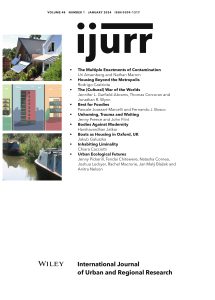In this article we seek to advance our understanding of unhoming in a population not previously perceived to be vulnerable to such processes. We examine the particular forms of trauma in an emergent space of urban marginality, which has arisen through the fracturing of longstanding citizen–state relations and the rupturing of habitual orientations to home in a world that had hitherto been knowable and predictable. In this article we highlight the centrality of waiting in experiences of unhoming, which act as a mechanism of domination over a group newly subject to a specific manifestation of marginality; this mechanism has particular significance for understanding the differentiated dynamics of urban displacement. In this article we utilize interviews with 31 residents of residential flats in England living in buildings affected by fire safety defects, identified following the 2017 Grenfell Tower fire disaster in London in which 72 individuals died. We argue that research on urban dispossession needs to be attentive to distinctive processes and consequences of—and resistance to—unhoming. The experiences of newly affected populations unmask the underpinning precarity and unequal power relations of housing-based urban citizenship.
Details
Written by:
Jenny Preece & John Flint
Digital Object Identifier (DOI)
10.1111/1468-2427.13213
About DOI

